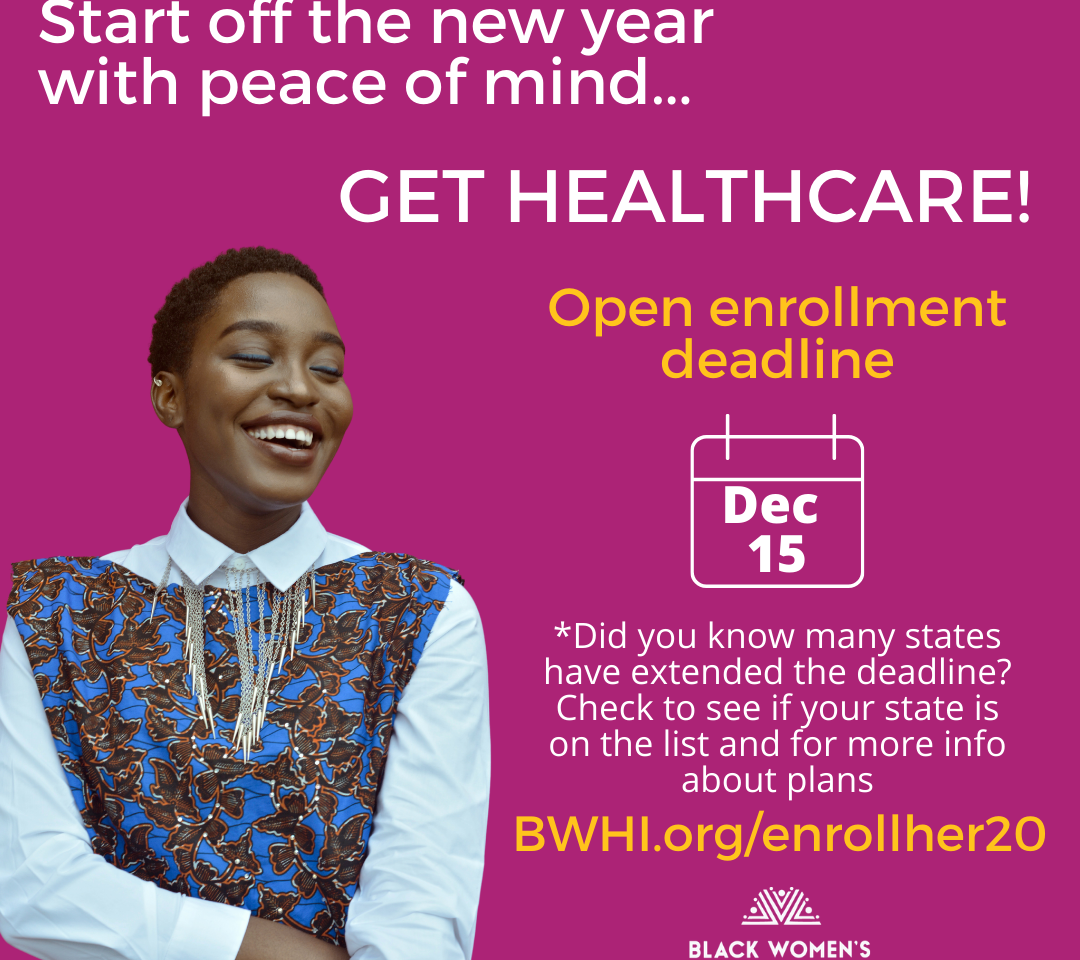By: Linda Goler Blount, MPH; President and CEO, Black Women’s Health Imperative and Dr. Angela Marshall, MD FAC; President and CEO, Comprehensive Women’s Health Primary Care Center and Board Chair, Black Women’s Health Imperative
As an American, African American Woman and the President and CEO of the Black Women’s Health Imperative, when I think about the state of Black health in 2020, I can say with assurance that COVID-19 has been this century’s most significant impact to the health and well-being of the Black community. We are living through a public health crisis that has hit Black and Brown communities harder than White communities, and the mortality rates from COVID-19 are highest among Black women and men. Having access to health care coverage is important at all times. But being covered amid a pandemic that is spreading like wildfire and, recently, killing 2,000 Americans per day is essential.
However, it’s not just about COVID-19. Even before the pandemic, more than 18 million Americans at highest risk for COVID-19 complications lacked adequate health insurance according to a study published in the August 2020 edition of the Journal of General Internal Medicine. Before the pandemic, about 6.7 million uninsured people were eligible for Medicaid, and 9.2 million of the uninsured were eligible for financial assistance on the ACA marketplaces. In total, 57% of the uninsured were eligible for financial assistance to help them get health insurance coverage. Most could get insurance for free or for a nominal amount, Kaiser reports.
One of the challenges for those eligible for health care coverage through the ACA is the perception of cost and affordability. Studies show last year, over 70 percent of uninsured individuals didn’t sign up for care because they didn’t think they could pay the premiums each month. The removal of the individual mandate and penalty contributed to the decrease as well. While many have health care coverage through their employer, we don’t talk enough about those who do not have coverage through their jobs or are unemployed and believe coverage is not an option for them. Millions of Black and Brown Americans are needlessly falling through the cracks, and COVID-19 is only increasing the dire effects of being uninsured.
On December 15, 2020, the Open Enrollment period for coverage starts January 1, 2021 closes. We have a lot of work to do in a short amount of time to make sure that our communities are aware of and can act on their health care coverage options. There is the ACA marketplace, and there are coverage options through Medicaid. As of October 2020, 39 states, including DC, opted to expand Medicaid for adults under the ACA.
How Are We Doing Now?
So how are we doing in reaching those who need to know? According to a report from the Centers for Medicare and Medicaid in this open enrollment period that started November 1, over 2.3 million people have signed up for coverage through the ACA marketplace. But we, who work in advocacy and community outreach, have to do better. Thanks to COVID-19 related business closures and layoffs, more people than ever are finding themselves without coverage, and for the first time needing to explore ACA plan options
Too many Black women and men living without health insurance coverage are also living with significant health conditions. And in the year of COVID-19, we know that at least 5 million Americans who are considered at the highest risk for contracting the virus are also most likely without health insurance coverage. These are also the same people who are forced to skip doctor visits and wait too late to get care because they don’t have coverage or money to cover copays for their visits.
But it doesn’t have to be that way. We must get people enrolled in health care coverage and then do the outreach and education to make sure they know how to use the coverage they have. That means that our churches and faith community, community-based organizations, schools and institutions of higher education, fraternities and sororities, and nonprofit organizations that serve the Black community in every city and state in the country must roll up our sleeves.
This is urgent, and the clock is ticking. At the Black Women’s Health Imperative, we are fearless in our work to protect and advance health and wellness for Black women. No one person or organization can truly address health disparities or higher mortality rates among African Americans unless we commit ourselves to ensure that our people have access to health care. Let’s do this together. Join in the movement to save lives and get our community covered. Speak out using #EnrollHer20 and enroll at BWHI.org/EnrollHer20.


